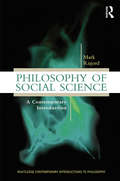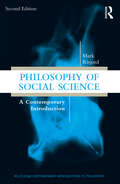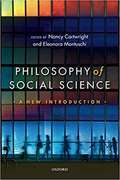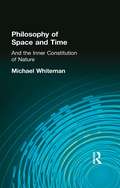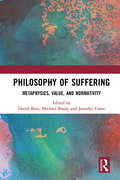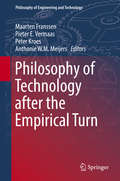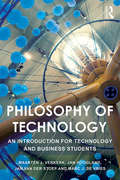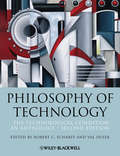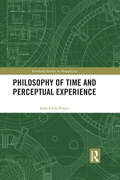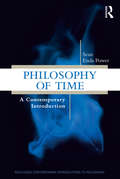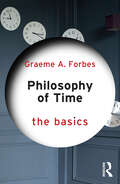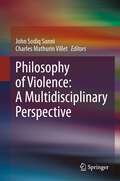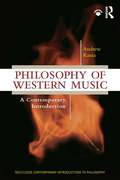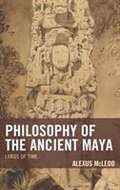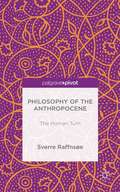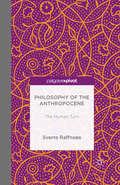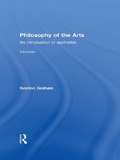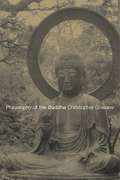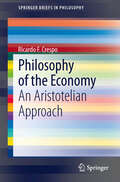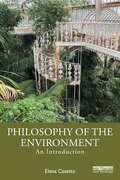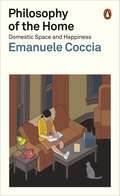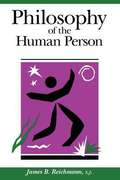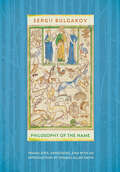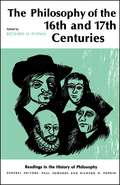- Table View
- List View
Philosophy of Social Science: A Contemporary Introduction (Routledge Contemporary Introductions to Philosophy)
by Mark RisjordThe Philosophy of Social Science: A Contemporary Introduction examines the perennial questions of philosophy by engaging with the empirical study of society. The book offers a comprehensive overview of debates in the field, with special attention to questions arising from new research programs in the social sciences. The text uses detailed examples of social scientific research to motivate and illustrate the philosophical discussion. Topics include the relationship of social policy to social science, interpretive research, action explanation, game theory, social scientific accounts of norms, joint intentionality, reductionism, causal modeling, case study research, and experimentation.
Philosophy of Social Science: A Contemporary Introduction (Routledge Contemporary Introductions to Philosophy)
by Mark RisjordPhilosophy of Social Science: A Contemporary Introduction examines perennial questions of philosophy through engaging the empirical study of society. Questions of normativity concern the place of values in social scientific inquiry. Questions of naturalism concern the relationship between the natural and the social sciences. And questions of reductionism ask how social institutions relate to the people who constitute them. This accessible text offers a comprehensive overview of debates in the field, with special attention to new research programs. Topics include the relationship of social policy to social science, interpretive research, cognitive and evolutionary explanations, intentional action explanation, rational choice theory, conventions and social norms, joint intentionality, causal inference, and experimentation. Detailed examples of social scientific research motivate the philosophical questions and illustrate the important concepts. Treating philosophical commitments as implicit in social science, students of the social sciences will benefit from its application of philosophical argument to methodological and theoretical problems. The text argues that social science transforms philosophical questions, and students of philosophy will benefit from its direct engagement with contemporary debates. The Second Edition provides updates with the most recent literature and adds two new chapters: one on modeling and one on the role of race and gender in the social sciences. Key Updates to the Second Edition: A new chapter on "Modeling and Explaining," which explores how models represent social systems and whether highly idealized models explain A new chapter on "Race and Other Social Constructions," capturing much of the recent empirical research and philosophical interest in the social construction of categories like race and gender Revised and updated chapters throughout, clarifying earlier presentations and bringing discussions from the First Edition into line with new research Updated annotated Further Reading lists, which now include relevant publications from 2013 to 2022.
Philosophy of Social Science: A New Introduction
by Nancy Cartwright Eleanora MontuschiThis is a much-needed new introduction to a field that has been transformed in recent years by exciting new subjects, ideas, and methods. It is designed both for students with central interests in philosophy and those planning to concentrate on the social sciences, and it presupposes no particular background in either domain. From the wide range of topics at the forefront of debate in philosophy of social science, the editors have chosen those which are representative of the most important and interesting contemporary work. A team of distinguished experts explore key aspects of the field such as social ontology (what are the things that social science studies?), objectivity, formal methods, measurement, and causal inference. Also included are chapters focused on notable subjects of social science research, such as well-being and climate change. Philosophy of Social Science provides a clear, accessible, and up-to-date guide to this fascinating field.
Philosophy of Space and Time: And the Inner Constitution of Nature
by Michael WhitemanThis is Volume XVII of seventeen in a series on Metaphysics. Originally published in 1967, this is a phenomenological study into the philosophy of space and time and the inner constitution of nature and the theory of everything being 'simply located'.
Philosophy of Suffering: Metaphysics, Value, and Normativity
by Michael Brady Jennifer Corns David BainSuffering is a central component of our lives. We suffer pain. We fall ill. We fail and are failed. Our loved ones die. It is a commonplace to think that suffering is, always and everywhere, bad. But might suffering also be good? If so, in what ways might suffering have positive, as well as negative, value? This important volume examines these questions and is the first comprehensive examination of suffering from a philosophical perspective. An outstanding roster of international contributors explore the nature of suffering, pain, and valence, as well as the value of suffering and the relationships between suffering, morality, and rationality. Philosophy of Suffering: Metaphysics, Value, and Normativity is essential reading for students and researchers in philosophy of mind, philosophy of psychology, cognitive and behavioral psychology as well as those in health and medicine researching conceptual issues regarding suffering and pain.
Philosophy of Technology after the Empirical Turn
by Maarten Franssen Peter Kroes Pieter E. E. Vermaas Anthonie W.M. W. M. MeijersThis volume features 16 essays on the philosophy of technology that discuss its identity, its position in philosophy in general, and the role of empirical studies in philosophical analyses of engineering ethics and engineering practices. This volume is published about fifteen years after Peter Kroes and Anthonie Meijers published a collection of papers under the title The empirical turn in the philosophy of technology, in which they called for a reorientation toward the practice of engineering, and sketched the likely benefits for philosophy of technology of pursuing its major questions in an empirically informed way. The essays in this volume fall apart in two different kinds. One kind follows up on The empirical turn discussion about what the philosophy of technology is all about. It continues the search for the identity of the philosophy of technology by asking what comes after the empirical turn. The other kind of essays follows the call for an empirical turn in the philosophy of technology by showing how it may be realized with regard to particular topics. Together these essays offer the reader an overview of the state of the art of an empirically informed philosophy of technology and of various views on the empirical turn as a stepping stone into the future of the philosophy of technology.
Philosophy of Technology: An Introduction for Technology and Business Students (Philosophy Of Engineering And Technology Ser. #9)
by Jan Hoogland Maarten J Verkerk Jan van der Stoep Marc J. de VriesPhilosophy of Technology: An introduction for technology and business students is an accessible guide to technology’s changes , their ubiquitousness, and the many questions these raise. Designed for those with no philosophical background in mind, it is ideal for technology and engineering students or specialists who want to learn to think critically about how their work influences society and our daily lives. The technological, business environment and daily experiences are the starting point of the book and the authors’ reflect upon these practices from a philosophical point of view. The text goes on to present a critical analysis of the subject including development, manufacturing, sales and marketing and the use of technological products and services. The abstract ideas are made easier to grasp with a story-telling approach: a vivid history of the discipline and colourful portraits of the core thinkers in this domain, as well as four case studies drawing from various engineering disciplines to demonstrate how philosophy can and should influence technology in practice. The first comprehensive introduction to this vibrant young sub-discipline in over 20 years, this is an ideal textbook for students of technology and engineering beginning a course or project in the philosophy of their subject.
Philosophy of Technology: The Technological Condition: An Anthology (Blackwell Philosophy Anthologies #3)
by Robert C. ScharffThe new edition of this authoritative introduction to the philosophy of technology includes recent developments in the subject, while retaining the range and depth of its selection of seminal contributions and its much-admired editorial commentary. Remains the most comprehensive anthology on the philosophy of technology available Includes editors’ insightful section introductions and critical summaries for each selection Revised and updated to reflect the latest developments in the field Combines difficult to find seminal essays with a judicious selection of contemporary material Examines the relationship between technology and the understanding of the nature of science that underlies technology studies
Philosophy of Time and Perceptual Experience (Routledge Studies in Metaphysics)
by Sean Enda PowerThis book explores the important yet neglected relationship between the philosophy of time and the temporal structure of perceptual experience. It examines how time structures perceptual experience and, through that structuring, the ways in which time makes perceptual experience trustworthy or erroneous. Sean Power argues that our understanding of time can determine our understanding of perceptual experience in relation to perceptual structure and perceptual error. He examines the general conditions under which an experience may be sorted into different kinds of error such as illusions, hallucinations, and anosognosia. Power also argues that some theories of time are better than others at giving an account of the structure and errors of perceptual experience. He makes the case that tenseless theory and eternalism more closely correspond to experience than tense theory and presentism. Finally, the book includes a discussion of the perceptual experience of space and how tenseless theory and eternalism can better support the problematic theory of naïve realism. Philosophy of Time and Perceptual Experience originally illustrates how the metaphysics of time can be usefully applied to thinking about experience in general. It will appeal to those interested in the philosophy of time and debates about the trustworthiness of experience.
Philosophy of Time: A Contemporary Introduction (Routledge Contemporary Introductions to Philosophy)
by Sean Enda PowerAs a growing area of research, the philosophy of time is increasingly relevant to different areas of philosophy and even other disciplines. This book describes and evaluates the most important debates in philosophy of time, under several subject areas: metaphysics, epistemology, physics, philosophy of language, philosophy of mind, cognitive science, rationality, and art. Questions this book investigates include the following. Can we know what time really is? Is time possible, especially given modern physics? Must there be time because we cannot think without it? What do we experience of time? How might philosophy of time be relevant to understanding the mind–body relationship or evidence in cognitive science? Can the philosophy of time help us understand biases toward the future and the fear of death? How is time relevant to art—and is art relevant to philosophical debates about time? Finally, what exactly could time travel be? And could time travel satisfy emotions such as nostalgia and regret? Through asking such questions, and showing how they might be best answered, the book demonstrates the importance philosophy of time has in contemporary thought. Each of the book’s ten chapters begins with a helpful introduction and ends with study questions and an annotated list of further reading. This and a comprehensive bibliography at the end of the book prepare the reader to go further in their study of the philosophy of time.
Philosophy of Time: The Basics (The Basics)
by Graeme ForbesWhat is time? Does it pass? Is the future open? Why do we care? Philosophy of Time: The Basics doesn’t answer these questions. It does give you an opinionated introduction to thinking a bit more deeply about them. Written in a way that assumes no philosophical background from its readers, this book looks at central topics in philosophy of time and shows how they relate to other time-related topics – from theoretical physics (without the maths!) to your own mortality. Additional questions include: In what way is time different to space? How long is the present? Does the Theory of Relativity show time doesn’t pass? What makes time have a direction or ‘arrow’? Can you be harmed by your own death? Allowing the reader to think more deeply about time, this book begins to untangle some of the most difficult knots in all of philosophy. It also provides practical advice to prospective time-travelers.
Philosophy of Violence: A Multidisciplinary Perspective
by John Sodiq Sanni Charles Mathurin VilletThis volume explores the role of violence generally but with specific reference to African concepts and themes, and the significance they have for social redress. The contributors interpret African concepts and themes to include accounts of violence, explicitly or implicitly construed from indigenous axiological resources like Ubuntu or personhood and from those works that are not African in origin but have become central in African moral, political and legal thought, such as Hannah Arendt’s On Violence and Walter Benjamin’s Critique of Violence. The volume contributes to moral philosophy, social philosophy, African philosophy, and political philosophy/theory. It situates itself within the Global South, specifically the African perspective, to explore, articulate, and defend (or even critique) African conceptions of violence. This volume also takes seriously the need to tap into the intellectual resource of the African and diasporic African episteme thruthinkers such as Steve Biko, Frantz Fanon and Reiland Rabaka. It appeals to students and researchers working in philosophy and related disciplines on violence in Africa and the postcolonial context.
Philosophy of Western Music: A Contemporary Introduction (Routledge Contemporary Introductions to Philosophy)
by Andrew KaniaThis is the first comprehensive book-length introduction to the philosophy of Western music that fully integrates consideration of popular music and hybrid musical forms, especially song. Its author, Andrew Kania, begins by asking whether Bob Dylan should even have been eligible for the Nobel Prize in Literature, given that he is a musician. This motivates a discussion of music as an artistic medium, and what philosophy has to contribute to our thinking about music. Chapters 2-5 investigate the most commonly defended sources of musical value: its emotional power, its form, and specifically musical features (such as pitch, rhythm, and harmony). In chapters 6-9, Kania explores issues arising from different musical practices, particularly work-performance (with a focus on classical music), improvisation (with a focus on jazz), and recording (with a focus on rock and pop). Chapter 10 examines the intersection of music and morality. The book ends with a consideration of what, ultimately, music is. Key Features Uses popular-song examples throughout, but also discusses a range of musical traditions (notably, rock, pop, classical, and jazz) Explains both philosophical and musical terms when they are first introduced Provides publicly accessible Spotify playlists of the musical examples discussed in the book Each chapter begins with an overview and ends with questions for testing comprehension and stimulating further thought, along with suggestions for further reading
Philosophy of mathematics
by Hilary Putnam Paul BenacerrafThe twentieth century has witnessed an unprecedented 'crisis in the foundations of mathematics', featuring a world-famous paradox (Russell's Paradox), a challenge to 'classical' mathematics from a world-famous mathematician (the 'mathematical intuitionism' of Brouwer), a new foundational school (Hilbert's Formalism), and the profound incompleteness results of Kurt Gdel. In the same period, the cross-fertilization of mathematics and philosophy resulted in a new sort of 'mathematical philosophy', associated most notably (but in different ways) with Bertrand Russell, W. V. Quine, and Gdel himself, and which remains at the focus of Anglo-Saxon philosophical discussion. The present collection brings together in a convenient form the seminal articles in the philosophy of mathematics by these and other major thinkers. It is a substantially revised version of the edition first published in 1964 and includes a revised bibliography. The volume will be welcomed as a major work of reference at this level in the field.
Philosophy of the Ancient Maya: Lords of Time (Studies in Comparative Philosophy and Religion)
by Alexus McLeodThis book investigates some of the central topics of metaphysics in the philosophical thought of the Maya people of Mesoamerica, particularly from the Preclassic through Postclassic periods. <p><p> This book covers the topics of time, change, identity, and truth, through comparative investigation integrating Maya texts and practices―such as Classic Period stelae, Postclassic Codices, and Colonial-era texts such as the Popol Vuh and the books of Chilam Balam―and early Chinese philosophy.
Philosophy of the Anthropocene: The Human Turn
by Sverre RaffnsøeThe Anthropocene is heralded as a new epoch distinguishing itself from all foregoing eons in the history of the Earth. It is characterized by the overarching importance of the human species in a number of respects, but also by the recognition of human dependence and precariousness. A critical human turn affecting the human condition is still in the process of arriving in the wake of an initial Copernican Revolution and Kant's ensuing second Copernican Counter-revolution.Within this landscape, issues concerning the human - its finitude, responsiveness, responsibility, maturity, auto-affection and relationship to itself - appear rephrased and re-accentuated as decisive probing questions. In this book Sverre Raffnsøe explores how the change has ramifications for the kinds of knowledge that can be acquired concerning human beings and for the human sciences as a study of human existential beings in the world.
Philosophy of the Arts: An Introduction to Aesthetics
by Gordon GrahamPhilosophy of the Arts presents a comprehensive and accessible introduction to those coming to aesthetics and the philosophy of art for the first time. The third edition is greatly enhanced by new sections on art and beauty, modern art, Aristotle and katharsis, and Hegel. Each chapter has been thoroughly revised with fresh material and extended discussions. As with previous editions, the book: is jargon-free and will appeal to students of music, art history and literature as well as philosophy looks at a wide range of the arts from film, painting and architecture to fiction, music and poetry discusses a range of philosophical theories of thinkers such as Hume, Kant, Gaender, Collingwood, Derrida, Hegel and Croce contains regular summaries and suggestions for further reading.
Philosophy of the Buddha: An Introduction
by Christopher GowansPhilosophy of the Buddha is a philosophical introduction to the teaching of the Buddha. It carefully guides readers through the basic ideas and practices of the Buddha, including kamma (karma), rebirth, the not-self doctrine, the Four Noble Truths, the Eightfold Path, ethics, meditation, non-attachment, and Nibbâna (Nirvana).The book includes an account of the life of the Buddha as well as comparisons of his teaching with practical and theoretical aspects of some Western philosophical outlooks, both ancient and modern. Most distinctively, Philosophy of the Buddha explores how Buddhist enlightenment could enable us to overcome suffering in our lives and reach our full potential for compassion and tranquillity.This is one of the first books to introduce the philosophy of the Buddha to students of Western philosophy. Christopher W. Gowans' style is exceptionally clear and appropriate for anyone looking for a comprehensive introduction to this growing area of interest.
Philosophy of the Economy
by Ricardo F. CrespoThis book develops a philosophical analysis of economic reality and economic science from an Aristotelian point of view. It is the result of many years of thinking and philosophical study about these topics. It differs from other philosophy of economics books as it also deals with economic reality (not only the science) and approaches its subject from an Aristotelian perspective. It differs from other Aristotelian studies about economics as it covers the whole of philosophy of the economy. This book argues why Aristotle's thinking guarantees an appropriate interdisciplinary synthesis.
Philosophy of the Environment: An Introduction
by Elena CasettaThis textbook offers a reasoned and accessible introduction to the philosophy of the environment and the current environmental crisis, designed for scholars and students in both philosophy and the natural and environmental sciences.The volume addresses the history and meanings of the concept of "environment", provides a theory of the relation between living beings and their environments, and tackles a wide spectrum of key philosophical issues related to the environment and the environmental crisis in a straightforward framework and accessible style. The book’s unique approach to environmental philosophy addresses the environment of all living beings and extends beyond environmental ethics to include conceptual history and analysis together with insights from evolutionary and developmental biology, ecology, and environmental and conservation sciences. The book consists of five chapters, each built around a specific thesis drawing upon philosophers and concepts including George Canguilhem, Rachel Carson, Donna Haraway, Lamarck’s and Darwin's evolutionary theories, Humboldt’s theory of nature, and the Gaia hypothesis. The final chapter introduces topics such as environmental denialism and post-natural environmentalism as conceptual tools for better understanding the current ecological crisis.Targeted at students and scholars in both philosophy and the environmental and life sciences, the book distinguishes itself through its approachable style and choice of topics, which are also well suited to junior researchers who seek to better understand the current environmental crisis.
Philosophy of the Home: Domestic Space and Happiness
by Emanuele CocciaA bedroom, a kitchen, a bathroom - are these rooms all that make a home? Not at all, argues Emanuele Coccia. The buildings we inhabit are of immense psychological and cultural significance. They play a decisive role in human flourishing and, for hundreds of years, their walls and walkways, windows and doorways have guided our relationships with others and with ourselves. They reflect and reinforce social inequalities; they allow us to celebrate and cherish those we love. They are the places of return that allow us to venture out into the world.In this intimate, elegantly argued account, Coccia shows how the architecture of home has shaped, and continues to shape, our psyches and our societies, before then masterfully leading us towards a more creative, ecological way of dwelling in the world.
Philosophy of the Human Person
by James B. ReichmannThis book provides the student of philosophy with a comprehensive discussion of the human experience, with the single aim of uncovering the meaning of being human.
Philosophy of the Name (NIU Series in Orthodox Christian Studies)
by Sergii BulgakovThis is the first English translation, by Thomas Allan Smith, of Philosophy of the Name (Filosofiia imeni). Sergii Bulgakov (1871–1944) wrote the book in response to a theological controversy that erupted in Russia just before the outbreak of World War I. Bulgakov develops a philosophy of language that aims to justify the truthfulness of the statement "the Name of God is God himself," a claim provoking debate on the meaning of names, and the Name of God in particular. Philosophy of the Name investigates the nature of words and human language, considers grammar and parts of speech, and concludes with an exposition on the Name of God.Name-glorifying, a spiritual movement connected with the Orthodox practice of the Jesus Prayer, was initially censured by the Holy Synod of the Russian Orthodox Church, and the controversy raised profound questions that continue to vex ecclesiastical authorities and theologians today. The controversy exposed a vital question concerning the ability of human language to express experiences of the Divine truthfully and authentically. Bulgakov examines the idea that humans do not create words, rather, objects speak their word to human beings, and words are the incarnation of thought in a sonic body conveying meaning.Philosophy of the Name offers a philosophy of language for contemporary theologians of all confessions who wrestle with the issue of language and God. It is a persuasive apologia for the mysterious power of words and an appeal to make use of words responsibly not only when speaking about God but equally when communicating with others.
Philosophy of the Sixteenth and Seventeenth Centuries
by Richard H. PopkinPhilosophers of the Sixteenth and Seventeenth Century
